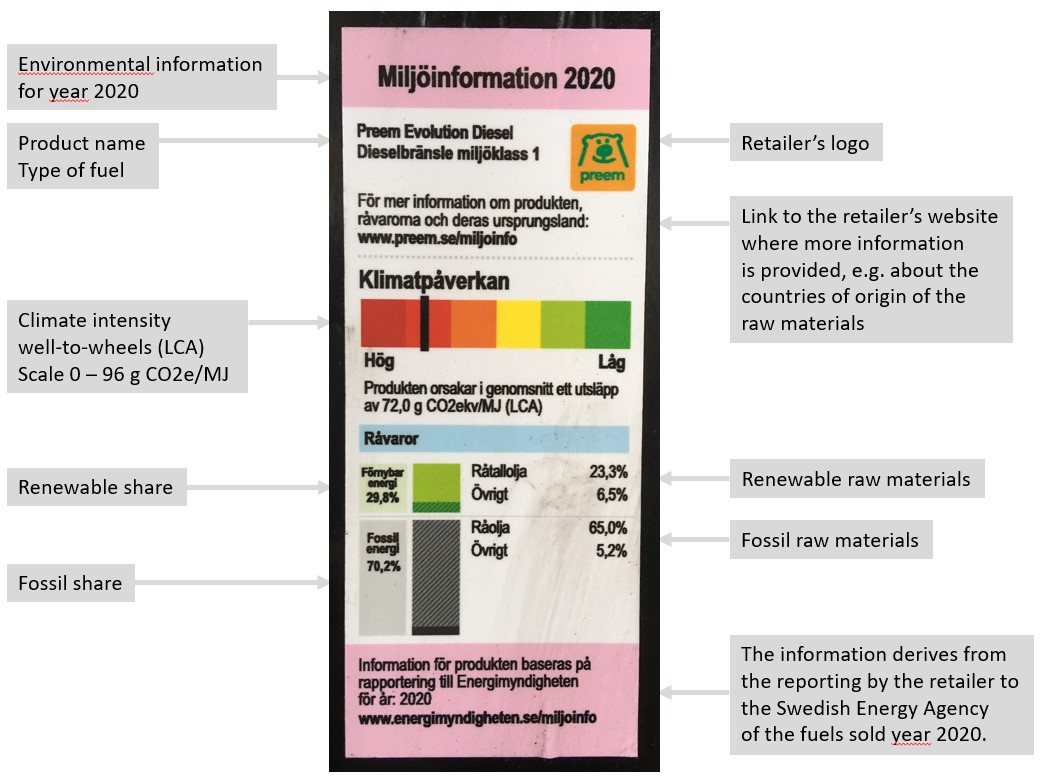- Gröna kommuner på väg
- Vi Vill Veta
- Jag Vill Veta
- Fixa Elbil
- Fossilfrihet till varje pris?
- Hela gröna vägen - fossilfria transporter 2030, Ja tack!
- Färdplan 2030
- På vägen
- KTH Mobility Pool
- Nollzon
- Stadsmobilitet
- Landsomfattande kommungranskningar
- Individuella kommungranskningar
- KomKomKom
- Inte bilen under milen
- Medbestämmande Syd
- Gasbilsturnén 2009
- Energieffektiva bilar
- Hållbara Drivmedel
The winding road to eco-labels on Swedish fuel dispensers
No later than October 1, 2021, Swedish fuel dispensers must carry eco-labels that disclose the climate intensity of the fuel, together with its raw materials. The country of origin of the raw materials will be disclosed on the fuel retailers' web sites. The same goes for electricity sold at charging stations run by fuel retailers. Here we tell the history of the initiative from the perspective of the Swedish Association of Green Motorists. We also discuss some lessons from the political process.
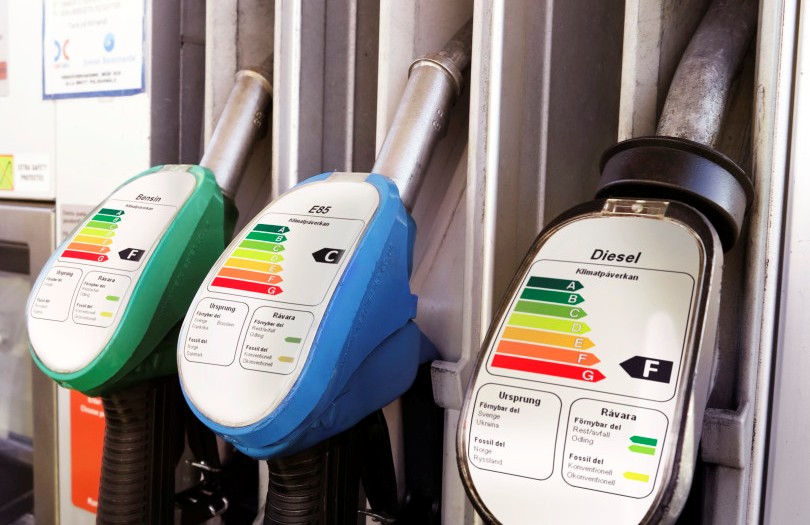 Inspirational mockup by the Green Motorists put together in 2013. Compare the actual eco-labels at the bootom of this page, put up in 2021.
Inspirational mockup by the Green Motorists put together in 2013. Compare the actual eco-labels at the bootom of this page, put up in 2021.
Over the years, many people have reacted to the lack of any kind of environmental information at the gas station about the fuels that we are about to pour into our cars. The difference is stark comparing to food, where declarations of content and origin are often provided, and we can look for a variety of voluntary environmental labels.
Even professional fuel purchasers have been unable to get meaningful sustainability information about the larger batches they are going to choose between. When the cities of Stockholm and Gothenburg purchased transportation fuel in 2007, they asked the fuel companies to enclose sustainability information in their offers. In particular they wanted to know the geographical origin of the crude oil. The companies had a hard time fulfilling these requirements. At a joint procurement by Eskilstuna and Stockholm the companies threatened to sue the cities, arguing that the demands were too tough in relation to the small quantities of fuel that were about to be purchased. The cities backed off.
Even so, the national agency that assists public purchasers started to recommend such sustainability requirements a couple of years later, knowing well that they couldn’t always be fulfilled.
There are parallels between the fossil fuel industry and the tobacco industry. Of course, fuels are necessary and useful, whereas tobacco is not. However, the health hazards associated with the burning of the products from the two industries and inhaling their smoke are similar. In addition, the fossil fuel industry is also associated with climate change and other environmental hazards.
Nevertheless, there is a WHO framework convention on tobacco control, but nothing of the sort when it comes to fossil fuels. The convention on tobacco control contains demands that information about contents and emissions shall be produced (Article 9) and disclosed (Article 10), and also that warning labels shall be displayed (Article 11). Similar demands on the fuel industry about disclosure and warnings have been sorely lacking. The spills associated with oil drilling in Siberia have been up to five times as large per year as the spill in the Mexican Gulf after the Deepwater Horizon accident. Photo: Greenpeace
The spills associated with oil drilling in Siberia have been up to five times as large per year as the spill in the Mexican Gulf after the Deepwater Horizon accident. Photo: Greenpeace
Shaping the idea
Already in 2007 the Green Motorists stated in a strategy document that it was important to achieve "clear labelling of the CO2-efficiency of renewable fuels".
The sustainability of biofuels was intensely debated in 2007 and 2008. This debate contributed to the adoption by the EU in 2009 of the Renewable energy directive, which specified sustainability criteria for biofuels, including methods to calculate their climate impact from a well-to-wheels perspective. Biofuels that were regarded as sustainable had to be traceable, in order to make it possible to check whether the sustainability criteria were actually met.
There was no corresponding development for fossil fuels when it comes to sustainability criteria and traceability. This imbalance triggered efforts from public purchasers, such as those described above, to formulate their own demands and request information about the origin of the crude oil.
The Swedish Association of Green motorists and other organisations started to ask questions to the Swedish fuel companies, urging them to disclose the sustainability information they possessed about all of their fuels – fossil and renewable alike – and to secure their traceability on a voluntary basis. The answers to such questions were collected in 2010 in a report written by the Green Motorists.
In 2011 the Green Motorists saw the need for a more elaborate report that scrutinized the Swedish fuel market from a sustainability perspective. Ideas surfaced that we should produce sustainability stickers that retailers could put on their fuel pumps.
These ideas were inspired in part by a regulation formulated in 2011 by the Swedish Energy market inspectorate, forcing electricity companies to disclose the climate impact and origin of the electricity on the bills and on their web pages. This regulation implemented the EU-directive from 2003 that defines rules for the European electricity market.
Shortly before the elaborate fuel report was published by the Green Motorists, the EU-commission announced in January 2013 its Clean fuel strategy, leading in 2014 to the EU-directive on the deployment of alternative fuels infrastructure. The directive demands harmonized labels on all European fuel pumps, in order to make it easy for the average consumer to distinguish the growing number of fuel qualities on the market, and to decide which of these can be used in one’s own car.
In the proposal for these labels in January 2013, we missed consumer information about the sustainability issues that are the reason to promote infrastructure for alternative fuels in the first place. The Swedish trade organization for biofuels Svebio and employees at the City Hall of Stockholm suggested that the climate impact of the fuel in well-to-wheels perspective should also be displayed on the pump, in addition to the code telling which fuel is which.
In the process of writing our elaborate report in 2012, the Green Motorists asked questions to the fuel companies about the sustainability properties of their fuels, and learned the details how they reported these properties to the Swedish Energy Agency, according to regulations based on EU's Renewable energy directive and Fuel quality directive. We realized that it was possible to use the reported information to create meaningful and trustworthy eco-labels on the pump.
The Green Motorists therefore decided to include in our own fuel report a quite detailed proposal for eco-labels. In addition to the climate impact of the fuel, we suggested that its raw materials and their places of origin should also be displayed in an overall fashion. These can be as important as the climate impact in order to decide its sustainability. The relative lack of information about fossil fuels meant that common estimations by the EU of the climate impact of petrol and diesel would have to be used rather than company-specific calculations concerning their own fuel. It also meant that the retailers sometimes would have to declare that the origin of their fossil fuel is unknown. The latter is a valuable piece of information in itself.
Our elaborate fuel report was published in March 2013 together with a press release promoting eco-labels on fuel pumps. The associated campaign Jag Vill Veta (I Want to Know) was launched officially at a seminar at the World Trade Center in Stockholm on May 6th 2013, with the relevant Swedish stakeholders attending.
It is evident from the discussion above that there are several closely related aims relating to sustainability information about fuels:
- That Swedish fuel companies disclose the available sustainability information about each of their fuels in a standardized and easily accessible way, ideally on the pump
- That the same kind of disclosure is made in the entire EU, and possibly in other countries as well
- That the most sustainable fuels are stamped with voluntary environmental labels, just like food
- That better sustainability information is produced, in particular about fossil fuels
- That purchasers will ask for and be given elaborate sustainability information about the offered fuel batches, and make their choice based on this information
We decided to campaign exclusively for issue 1), since we realized that the entire web of related issues was too heavy for us to set in motion. Issue 4) is particularly tricky, since it requires new rules for global oil trade.
On the other hand, there is no difficulty in principle to reach aim 1), since it just involves disclosure of the information that the Swedish companies already possess. It is hard to argue against this idea without giving a bad impression. Therefore, we argued, if we pursued a sharp and persistent campaign for this narrow issue we would get the upper hand in the debates and something might happen. Then we could use the achieved disclosure at Swedish fuel pumps as a lever to set the other interrelated issues in motion.
Concerning issue 3), other actors had already established voluntary environmental labels for fuels, so we didn’t have to get involved in that business. At present there are two fuels on the Swedish market with environmental labels. Preem’s Evolution Diesel + is marked with the Svanen label (The Swan). This diesel can be used in any diesel car and contains at least 50 percent renewable raw material, to a large extent tall oil that emerges as a residue in paper industry. The biomethane (biogas) produced by the municipal energy company in Trollhättan by manure and sludge is marked with the label Bra Miljöval (Good Environmental choice), offered by the Swedish Society for Nature Conservation.
 The 100 percent renewable biomethane produced by the energy company in the town Trollhättan by local residues is awarded the environmental label "Bra Miljöval"
The 100 percent renewable biomethane produced by the energy company in the town Trollhättan by local residues is awarded the environmental label "Bra Miljöval"
First sketches
The idea of a climate label on the fuel pump that emerged from the City Hall of Stockholm was inspired by European energy labels on appliances, with their distinctive coloured bars. The Green Motorists also made a similar first sketch. It turned out that it isn’t allowed to use these particular bars to grade anything else than energy consumption, so that they cannot be used to show the climate impact of fuels. But these energy labels nevertheless provided a mindset that still prevails.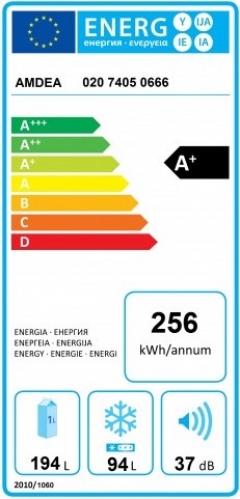
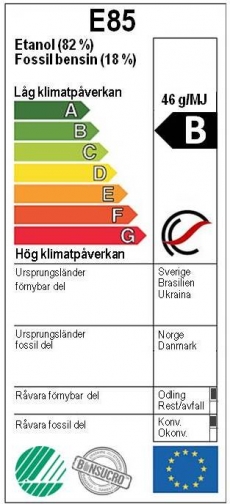 A European energy label for a fridge, and the first sketch by the Green Motorists of an eco-label for the transportation fuel E85 (comprising 82 percent bioethanol and 18 percent petrol as an annual average).
A European energy label for a fridge, and the first sketch by the Green Motorists of an eco-label for the transportation fuel E85 (comprising 82 percent bioethanol and 18 percent petrol as an annual average).
First reactions
Inspired by the publication of our fuel report, the Swedish National Television reported in March 2013 that it was impossible to avoid “foul petrol” at the fuel station, petrol that destroys the environment or fuel dictators. They asked the Green Motorists and the fuel industry whether something should be done about it. Their trade organisation SPBI answered that consumers probably aren’t interested.
On May 17th 2013 there was a debate on question raised in the parliament, initiated by Jens Holm from the Left party. Referring to the fuel report by the Green Motorists he asked the Minister for Energy Anna-Karin Hatt whether the government would take measures to introduce a declaration of origin at the fuel station so that consumers could make informed choices. Anna-Karin Hatt answered negatively by referring to the lack of complete sustainability information about fossil fuels, and argued that Sweden could not go ahead with its own rules in this respect, but had to work at the European level. In so doing, she avoided the question about aim 1) by referring to the difficulty to achieve aim 4). This conflation of issues has been made many times since, sometimes on purpose, sometimes not.
Opinion polls
To decide whether consumers indeed care about the possibility to make sustainable choices at the fuel station, the Green Motorists made the first of two public opinion surveys (showing virtually the same results) in the summer of 2014, in collaboration with the polling organization Novus. A representative sample of about 1 000 people between 18 and 79 years of age from all over Sweden was asked three questions. The interest from the public seemed considerable, despite the beliefs of the fuel trade organization SPBI.
To the question whether it is important to get information on the pump about the climate impact and origin of the fuel, 41 percent answered that it is very important or rather important. 29 percent answered that it is rather unimportant or not important at all.
To the question whether they would actively choose or avoid a fuel based on its country of origin, if given the opportunity, 72 percent answered that they would do so, or would probably do so. 23 percent answered that they would not do so, or probably not.
To the question whether they would preferably fill their car at fuel stations run by retailers who disclose the climate impact and the origin of their fuels, 54 percent answered that they would probably choose such retailers before those who do not provide such information, whereas 34 percent answered that they would probably not care.
The last question was motivated by the idea of ours that some fuel company may choose to make a disclosure of its own, even if there is no legislation demanding it. Then it may drag other companies along – and finally even the politicians.
Cooperation with fuel companies
The Green Motorists cooperated with a few fuel companies along these lines, most notably St1. They became the first company in spring 2015 to make a partial disclosure of the origin of their fuels on their web page, and advertised about this disclosure with a sticker on all of their pumps. The initiative got quite a deal of media attention. Some other major Swedish fuel companies reacted with frustration; they argued that they were equally good at consumer information, and that it was misleading hype to make such a big deal about a sticker on the pump that referred to a web page.
Hype or not, the initiative by St1 triggered the other fuel companies to improve the consumer information on their own web pages about the climate impact and origin of their fuels. The Green Motorists monitored and compared the development of this consumer information in a series of reports.
It didn’t take long until the other companies offered more complete sustainability information than St1, but it was often hard to find and fragmented in different web pages, annual reports and technical data sheets. No ordinary person would care to look it up. The gesture by St1 to invite their customers to the sustainability information via a sticker on their pumps was indeed a big deal in comparison, according to the Green Motorists.
Nevertheless it became evident after a while that no fuel company wanted to make a full disclosure voluntarily. They chose carefully what information to highlight and what information to hide or obscure according to their own interests, and each company presented the data in its own fashion. From a consumer perspective the situation was not satisfactory at all.
The companies had reached status quo, and our hope faded that the industry would ever offer adequate and comparable sustainability information about their products voluntarily. Actually, some of them argued themselves that it would be better to have common, official rules to avoid a “Wild West” of initiatives that conflated marketing and consumer information.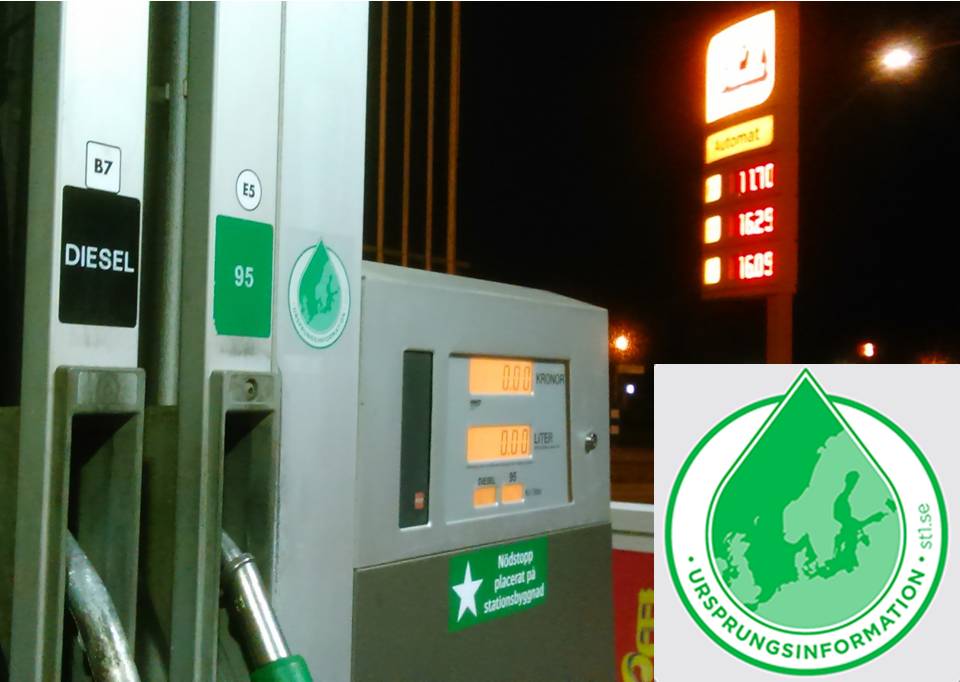 The fuel company St1 has put a sticker on each of their pumps, advertising for information at their web page about the origin of the fuels.
The fuel company St1 has put a sticker on each of their pumps, advertising for information at their web page about the origin of the fuels.
A certification body gets involved
In spring 2016 people were losing hope that anything was about to happen. The voluntary initiatives by the fuel companies had stalled, and there were yet no political initiatives to be seen. TRB is a network of forwarding agents and logistics companies that are promoting renewable fuels. They were seeking collaboration in order to bring the issue to new life, and found company in the state owned company RISE, which contains a certification body.
RISE collected a roundtable of stakeholders to discuss standardized, voluntary eco-labels on fuel pumps for which RISE would provide a third party certification. This initiative answered to the call by the fuel companies for common rules for eco-labels. The Green Motorists got involved, but we were afraid that the voluntary aspect of such a system would prevent it from take hold, given our experiences with the fuel companies. Also, we didn’t quite see a natural role for a third party certification body, since the available sustainability data that could be disclosed were already reported to, checked and approved by the Swedish Energy Agency.
In the summer of 2016 the government finally awoke. The Green Motorists were a bit worried that the parallel voluntary track would defuse the political initiative. Therefore the Green motorists put all eggs in the political basket from that point on.
The political process
Let us go back a bit in time. Before the general election to the Swedish parliament in September 2014, a representative of the Green party promised to initiate an official report studying the prospects for standardized eco-labels on fuel pumps – given that they became members of the government.
A representative of the Center party, belonging to the opposing political bloc, argued that fuel taxation based on climate impact would be a better instrument of control than standardized eco-labels, in order to steer the market towards more sustainable fuels. This may very well be so, but that is not an argument against eco-labels at fuel pumps. Such either-or thinking is another faulty argumentation that the Green Motorists have often encountered, besides the previously discussed conflation of issues from the list of five aims above.
The Green party indeed became part of the new government in fall 2014, but nothing much happened. In spring 2015 the Green Motorists posed questions about eco-labels on fuel pumps to all members of parliament. We got answers from representatives of five of the eight parties: the Christian democrats, the Sweden democrats, the Green party, the Social democrats and the Left party. These parties cover the entire ideological spectrum in the Swedish parliament.
It’s noteworthy that all these parties liked the idea of eco-labels on fuel pumps, and considered it important to reduce the climate impact of our fuels, and also to trace them to be able to tell whether they are environmentally and socially sustainable. It’s also noteworthy, however, that only the Left party was planning to take political action. The other parties just expressed passive support.
Things changed in May 2016, when Karolina Skog from the Green party was appointed Minister for the Environment. At her first meeting with her staff she broughtup eco-labels on fuel pumps as one of her priorities. The aim of the government to make headway on the issue was announced publicly for the first time at a summer seminar arranged by the Green Motorists by Karin Svensson Smith, also from the Green party, and head of the Parliamentary committee on transport and communications. In August 2016 Karolina Skog announced on National Television her intention to pass a bill about eco-labels on fuel pumps.
During the same period of time, the Ministry of Finance had been preparing its Strategy for sustainable consumption, which was released in October 2016. In that context they, too, had considered the introduction of eco-labels on fuel pumps, quite independently. After three years of passive benevolence from two different governments, there were suddenly two ministries within the same government which actively pursued this issue: the Ministry of the Environment and the Ministry of Finance.
 Hearing at the Ministry of Finance in November 2016 with Per Bolund (Left, Minister for Financial Markets and Consumer Affairs) and Karolina Skog (Right, Minister for the Environment), together with representatives of the fuel industry, consumer organizations like the Green Motorists, and other stakeholders. The ministers are listening to Ulf Svahn, CEO of SPBI, the trade organization for the large Swedish fuel companies.
Hearing at the Ministry of Finance in November 2016 with Per Bolund (Left, Minister for Financial Markets and Consumer Affairs) and Karolina Skog (Right, Minister for the Environment), together with representatives of the fuel industry, consumer organizations like the Green Motorists, and other stakeholders. The ministers are listening to Ulf Svahn, CEO of SPBI, the trade organization for the large Swedish fuel companies.
The time frame was tight since the government woke up late. People feared – or hoped – that they wouldn’t be able to put legislation in place before the next general election in September 2018. In December 2016 they ordered an official report analyzing the prospects for eco-labels on fuel pumps from the Swedish Energy Agency.
The report was released in April 2017. It advocated for disclosure by the fuel companies of the climate impact and origin of each of their fuels, based on the data they reported to the Agency concerning their sales the preceding year. The report concluded that it was legally and practically feasible that Sweden required eco-labels on fuel pumps based on such data, but stopped short of recommending them. As a first hand option, they argued instead that retailers should disclose the informationon their web pages in a standardized fashion.
To the Green Motorists it is essential that the sustainability information about the fuels is brought to the very place where people buy them. The crucial idea is to sensitize all motorists by coupling abstract issues like climate change to a personal choice, and to the physical action of pouring fuel into your car. Only those who are already well aware of the issues would look for the information at some web page.
It became a top priority for the Green Motorists to make sure that the government made it clear that there would indeed be labels on the pumps. In so doing we referred to behavioural experts in Sweden, and also to the campaign group Our Horizon, which promotes climate change warning labels on gas pumps in Canada and the US. They express this point very well. We also referred to Richard Thaler when he was awarded The Nobel Memorial Prize in Economic Sciences in 2017 for his work on behavioural economy, emphasizing the potentially large effect of the related issue of nudging.
Richard Thaler receives the "Nobel Prize for Economy" from the king of Sweden in December 2017.
In their referral responses to the report by the Energy agency, all consumer organizations, environmental organizations, and other national agencies reacted in the same way as we did: the sustainability information must be brought to the consumer at the fuel station in order to affect people, and to steer the market in the desired way.
After a few years of hesitation, the Center party had become an outspoken supporter of eco-labels on the pumps, beside the Left party, which had been promoting such labels from the beginning.
The Green Motorists wanted these two parties to state their position clearly in front of representatives of the government, together with as many other parties from the opposition as possible. Therefore we invited parties from the opposition as well as from the government to a seminar in the summer of 2017. Apart from representatives from the Center party and the Left party, a representative from a third opposition party showed up: the Christian democrats. All these opposition parties made it clear that the sustainability information must be brought to the pump in order to have any effect.
Another aim of that seminar was to show the government that there was broad support in the parliament for a bill about eco-labels on fuel pumps. This was important, since the government was in minority. To that end we asked the opposition parties explicitly whether they would vote yes to such a bill – and they answered affirmatively. These answers tied them to that position.
The support and pressure from opposition parties on different sides of the political spectrum may have contributed to the final public commitment by the government on National Television to pass a bill that brought the sustainability information to the fuel pump.
 Karolina Skog, Minister for the Environment from May 2016 to January 2019
Karolina Skog, Minister for the Environment from May 2016 to January 2019
Opposition and support from the fuel industry
The response from the fuel industry to what was about to happen was split. The large companies which sell mostly fossil fuels were very negative, along with their trade organization SPBI. The numerous smaller companies which sell mostly renewable fuels were positive, along with their trade organizations. The reason for the split is very simple: all companies realized that eco-labels would disfavour fossil fuels and favour renewable fuels. This is the very reason for the eco-labels, of course, and the strong reactions from the fuel companies meant they realized that eco-labels on the fuel pumps can make a difference.
The trade organization SPBI tried to find legal obstacles in order to prevent the eco-labels. They argued that it might go against the marketing and consumer protection laws to put a label on the pump with information that does not correspond exactly to the very fuel that is poured into the car, but rather the total sale of this fuel quality the previous year – arguing that it would be misleading. The government didn’t take these objections too seriously, it seems.
First, it was self evident that it should be made clear on the eco-label what the data corresponded to. Second, there were precedents. Companies that sell biogas as transportation fuel are allowed to sell it as such even if it is distributed in the same pipes as fossil natural gas, so that the motorist actually gets a mixture of biomethane and methane of fossil origin. More importantly, the declaration of climate impact and origin of on the Swedish electricity bills uses the same system: the disclosed data corresponds to the electricity sold by the company the previous year, not the very electrons that run through your wires the month you are paying for.
However, the Swedish government took another legal objection more seriously. The trade organization SPBI argued that the EU gave the fuel companies the right to keep the origin of their fuels secret. They referred to a sentence in Annex I to the Council Directive (EU) 2015/652 that defines the reporting requirements pursuant to the Fuel quality directive 2009/30/EC. It states:
“The information collected and reported by suppliers to the Member States concerning the origin of fuels shall be confidential, but this shall not prevent the publication by the Commission of general information or information in summary form which does not contain details relating to individual undertakings.”
A clear sign that the government took this objection seriously and feared to be taken to the EU court is the following. The official report from the Energy Agency recommended that the disclosure of the origin of the fuels should be required by law. However, this explicit requirement was removed in the subsequent government bill, put forward by the Ministry of the Environment.
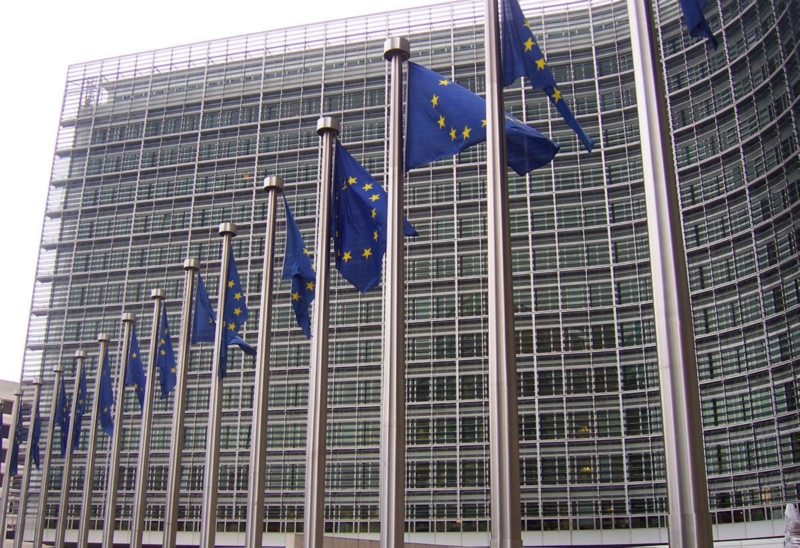 Photo: Wikimedia Commons
Photo: Wikimedia Commons
Efforts to secure declaration of origin
The Green Motorists decided to do whatever we could to make sure that there would be a compulsory declaration of origin on the eco-label, since this was a crucial part of the original idea. It went all the way back to 2007, when Stockholm and Gothenburg started to ask the suppliers about the origin of their fossil fuels as part of their public purchase.
The Green Motorists didn’t subscribe to the interpretation by SPBI that the EU gave the fuel companies the right to keep the origin of their fuel secret. To us, a more reasonable reading of the crucial sentence in directive (EU)2015/652 cited above is that it is not possible to refer to that directive in order to require that an individual fuel company disclose the origin of its fuels. However, this does not prevent that member states such as Sweden – or the EU itself – introduce another regulation with such a requirement.
To settle the matter we decided together with the 2030-secretariat – another Swedish campaign group for sustainable transport – to contact the EU commission and ask them to settle the matter. Their lawyers provided a formal response in April 2018, with the bottom line:
“As consumer information on the origin of fuels is not regulated at EU level, Member States may adopt national legislation on this matter. The requirement on the confidentiality of the information reported by suppliers to the Member States concerning the origin of fuels applies for the specific purposes of the Directive, which are different from providing consumer information on the origin of fuels. It has no implications for potential national legislation to provide consumer information on the origin of fuels.”
It may be noted that since then, EU has adopted a revised Renewable energy directive (EU)2018/2001 which requires that suppliers disclose to consumers the geographic origin and feedstock type of their biofuels on their websites. Again, this shows that the sentence about confidentiality in (EU)2015/652 does not prevent other legislation that demands public disclosure.
The Green Motorists raised the importance of declaration of origin on National Television in March 2018. The renewable fuel industry also made the case for a declaration of origin, increasing the pressure on the government.
The pressure from the political opposition increased as well, when the Left party and the Center party introduced bills in the parliament to demand that public disclosure of the origin of the fuels should be required by law, just like the Energy Agency proposed to begin with.
When representatives of the government were asked by the media and others in early spring 2018 whether there would be a declaration of origin or not, they answered that they didn’t know yet, because they had to check carefully whether it was consistent with EU legislation. Therefore, when the EU commission gave the clear go-ahead in April, the government virtually had no choice but to include a declaration of origin on the eco-label.
The legislation is put into place
The strategy by the Ministry of the Environment led by Karolina Skog was rather to pass a very general bill in the parliament before the summer break 2018 that gave them the authority to formulate a more precise government regulation during the summer. One reason for this strategy was the tight schedule: The government wanted to put a system in place before the general election in September 2018, and there was not enough time before summer to set all the details and to secure support for them in the parliament.
The general bill was passed in the parliament on June 20. It turned out that all eight parties voted for it except the Center party. The reason was that they wanted a more precise law, according to the abovementioned bill they had introduced on their own.
The debate in the Swedish parliament preceding the vote for the bill that opened the door to eco-labels on fuel pumps on June 20, 2018. The Minister for the Environment Karolina Skog is speaking.
In august 2018 the more detailed government regulation was announced. It contains all essential elements according to the Green Motorists: there will be a company-specific eco-label on the pump disclosing the climate impact of each fuel quality, together with its main raw materials and their origin, whenever these are known. At the web page of each retailer there will be a more comprehensive disclosure. The regulation is described in more detail in our English press release.
During 2019 the Swedish Energy Agency is deciding the fine details of the eco-labels, and also the rules for the comprehensive disclosure on the web.
The coming into force of the regulation has been postponed from the first of January 2020 to the first of May. This delay gives time for the fuel companies to report their sales during 2019 to the Swedish Energy Agency. This means that the data on display on the eco-labels when they are introduced will refer to 2019 rather than 2018, so that they make a better, more up-to-date first impression.
A plot twist
In the summer of 2019, the EU commission asked the Swedish government about the upcoming eco-labels. The commission was not satisfied with the answers that were meant to justify the declaration of origin. In October 2019 the commissioner for internal market and industry Elżbieta Bieńkowska sent a detailed opinion to the Swedish government, stating that the declaration of origin "represents a measure capable of hindering imports of fuels produced in other Member States". The claimed reason is that it "enable consumers to distinguish between domestic and imported goods and that this enables them to assert any prejudices, which they may have against foreign goods." Therefore it is contrary to Article 34 in the Treaty on the Functioning of the European Union (TFEU), which is meant to protect the free inner market.
Measures that are contrary to the spirit of the free inner market can be justified according to Article 36 in the same treaty, if they are of common interest. It is indeed of common interest to know the country of origin of transportation fuels, since the sustainability of a given fuel made of given raw materials often depends on its geographical origin. For this reason, the EU has, itself, included a new paragraph in its Renewable energy directive (EU)2018/2001 that requires the disclosure of the geographic origin of biofuels on the web as consumer information. For similar reasons, the EU has, itself, adopted legislation requiring the disclosure of the geograhic origin of meat, fish and vegetables.
It seemed to the Green Motorists that the complaint by of the EU commission was a product of the DG for internal market and industry only, since it contradicted - and did not even relate to - to the go-ahead given to Sweden by the DG for Climate Action in 2018, as desbribed above. The complaint also goes against the efforts by other bodies in the EU to improve consumer information about consumables, including disclosure of geographic origin, whenever relevant.
Unfortunately, the Swedich government backed away to avoid the EU court, at least half a step. It decided in April 2020 that the climate intensity and the raw materials will still be disclosed at the fuel pump or charging station, but the countries of origin will just be declared at the web site of the retailer, with a reference at the pump.
Forerunners
At the same time the Swedish government decided to delay the implementation from May 2020 to October 2021. It referred to the trouble with the EU, and also to the Swedish fuel industry, which claimed that it needed more time to adjust to the new rules.
Nevertheless, the energy company Kraftringen in southernmost Sweden decided in late June 2020 that they did not want to wait that long. From July 6th 2020 there are eco-labels on their biomethane dispensers and charging stations. These eco-labels are the world's first, to the best of our knowledge. In October 2020, the German energy company E.ON put up similar eco-labels on the biomethane dispensers in the 70 filling stations they operate in Sweden.
There are more companies specializing in renewable fuels that want to follow the examples of Kraftringen and E.ON, implementing the legislation ahead of time on a voluntary basis. Clearly, it is possible to implement the eco-labels on short notice, if there is will.
Eco-label on a biomethane station run by Kraftringen in Lund, Sweden. Photo: Alfred Andersson/The Green Motorists
The labels are up
In september 2021, eco-lables started to appear on gas stations all over Sweden, to meet the requirement that they should be up no later than October 1. The forerunners who put up labels in 2020 wanted to boast about their renewable fuels and electricity. Now we can see the climate impact rating of gas and diesel as well. Gas is at the upper red end of the climate impact rating.
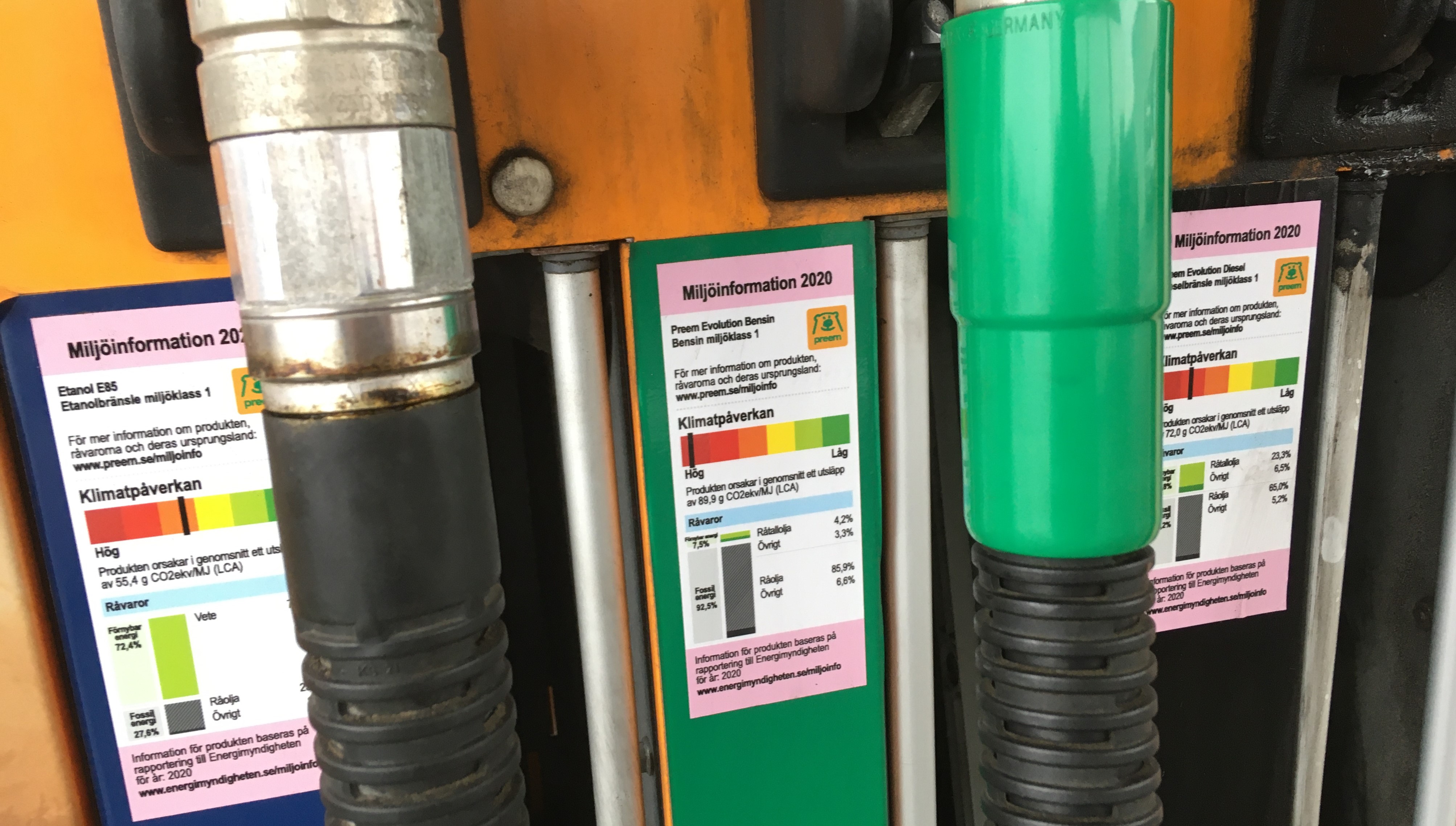 Eco-labels for ethanol E85 (left), petrol (center), and diesel (right) at a Swedish petrol station run by Preem. A climate impact rating is shown as a horizontal, coloured bar, running from red (high) to green (low). Photo: The Swedish Association of Green Motorists (click for high-res)
Eco-labels for ethanol E85 (left), petrol (center), and diesel (right) at a Swedish petrol station run by Preem. A climate impact rating is shown as a horizontal, coloured bar, running from red (high) to green (low). Photo: The Swedish Association of Green Motorists (click for high-res)
A couple of lessons
Needless to say, it’s too early to say anything about the effects of the eco-labels. Even so, there may be some useful lessons to learn from the process up until now.
It may be hard to find politicians who are willing to pursue eco-labels on fuel pumps, but it is even harder to find those who are overtly dismissive. It gives a bad impression to state explicitly that it is a poor idea to inform people of the sustainability properties of a product that is central to climate change and other environmental hazards.
There is no associated financial cost to the state, so politicians cannot say that some money is better put elsewhere. There is no associated regulation that explicitly limits the activities of the fuel companies, or raises their costs, so the politicians cannot say that jobs are lost. They cannot sat that emissions go somewhere else, because people will still need to fill their cars where they live and work – they will just choose more sustainable fuels, hopefully.
Left wing politicians have nothing against the idea to put tough disclosure demands on companies, and the right wing cannot help agreeing that this is a market oriented measure that may help steer the economy towards sustainability without too much state intervention, just like they envision. Even nationalists tend to like the idea, since declarations of origin tend to favour locally produced products. In this case this would enhance national energy independence, making each country less vulnerable to turmoil on the world scene.
Therefore, once a powerful politician or party is found that is willing to pursue the issue, there is a substantial chance that there will be a snowball effect, where more and more parties support and promote the idea. That was the case in Sweden, where all eight parties in the parliament voted for the new legislation in the end – except one party that wanted an even sharper law.
For these reasons it is relatively easy to campaign for eco-labels on fuel pumps, even if the passive benevolence that you often meet can be frustrating at times.
Another possible reason why it is easy to campaign for eco-labels is that they are teethless. However, the sometimes harsh resistance from the fuel companies which sell mostly fossil fuels speaks another language. We have heard people in that industry say that they do believe the eco-labels will affect the fuel market, but in a distorted way. Of course, the aim of the labels is rather the opposite: to enable straight and fair competition with sustainability.
|
|
Press release that describes the upcoming eco-labels in some detail |
|
|
The Green motorists' wider campaign We Want to Know |
|
|
Read more about the Green motorists |
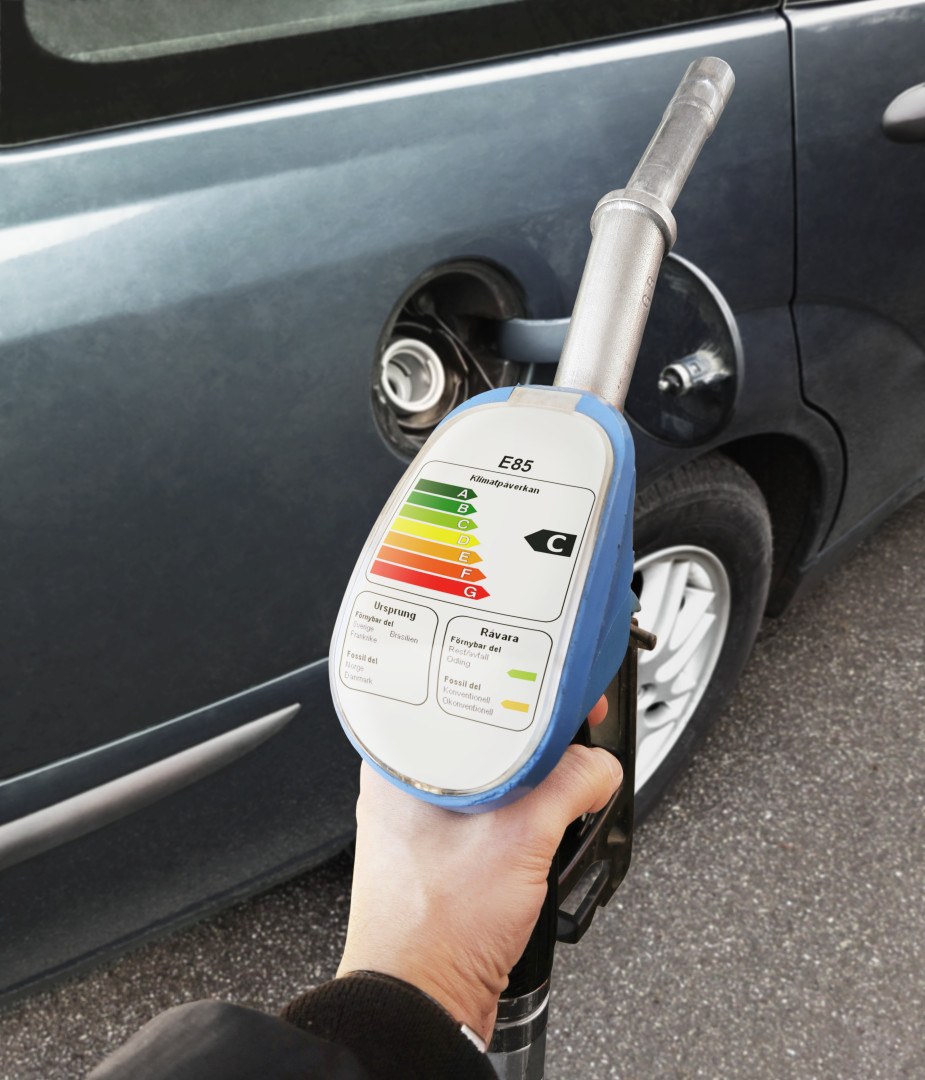 Inspirational mockup by the Green Motorists
Inspirational mockup by the Green Motorists
|
You can disclose information in different ways, be it facts about fuels that sometimes demolish the climate, the environment and our health – or plans to demolish Arthur Dent’s house in order to build a highway. Either you bring the information in front of the eyes of the people it concerns or else... “But the plans were on display…” “On display? I eventually had to go down to the cellar to find them.” “That’s the display department.” “With a flashlight.” “Ah, well, the lights had probably gone.” “So had the stairs.” “But look, you found the notice, didn’t you?” “Yes,” said Arthur, “yes I did. It was on display in the bottom of a locked filing cabinet stuck in a disused lavatory with a sign on the door saying ‘Beware of the Leopard.” Douglas Adams, The Hitchhiker’s Guide to the Galaxy |

